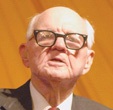By Bob Allen
Henry V. Langford, a white Baptist preacher whose support for racial equality caused him to be blackballed by churches in the 1950s, died Oct. 7 at age 93. A memorial service is planned at 4 p.m. Sunday, Oct. 28, at River Road Church, Baptist, in Richmond, Va., a congregation that remembers him as an elder prophet.
River Road Pastor Michael Clingenpeel described Langford as “a Baptist original.”
“Henry was a memorable personality, an able minister, an active member in our church, a tree farmer, an articulate spokesman for religious liberty and a prophet and pioneer in the area of race relations,” Clingenpeel said. “I will miss his humor, his encouragement and his ‘amens’ during my sermons.”
 A Florida native, Langford graduated from Mercer College and Southern Baptist Theological Seminary before serving as a U.S. Army chaplain during World War II. He returned home to serve as pastor of small churches in Virginia before his life changed after he used a weekly column he wrote for the local newspaper to voice support for the 1954 Brown v. Board of Education Supreme Court ruling that declared the “separate but equal” doctrine used to support school segregation unconstitutional.
A Florida native, Langford graduated from Mercer College and Southern Baptist Theological Seminary before serving as a U.S. Army chaplain during World War II. He returned home to serve as pastor of small churches in Virginia before his life changed after he used a weekly column he wrote for the local newspaper to voice support for the 1954 Brown v. Board of Education Supreme Court ruling that declared the “separate but equal” doctrine used to support school segregation unconstitutional.
In a groundbreaking Chatham Star-Tribune article reprinted 25 years later because of its impact, Langford said the justices had no other choice if they followed the U.S. Constitution, which they had sworn to do, and he urged readers to do the same.
“We, the people, need not be afraid of our Constitution,” he wrote. “It is our guide and we must abide by it.”
Langford advised readers: “It is true this decision will hurt for a few years, but only to the extent we think it will hurt. After a number of years of adjustment, first in lower grades and later in the upper grades, much prejudice from both races will disappear and we will have better understanding among all the people.”
Reaction was strong. Langford was eventually forced to resign as minister at Shockoe Baptist Church in Chatham, Va., and could not find another congregation that would call him as pastor.
He found a new calling in the Alcohol and Drug Education Council of Virginia Churches, where he served eight years as associate director and 13 as executive director, speaking to hundreds of school, church and community groups across Virginia about the signs and dangers of substance abuse during the 1960s and 1970s.
Langford finally received long-overdue recognition in 2007 when the Virginia General Assembly passed a joint resolution honoring “his commitment to justice and equality for all citizens.” The Ministering to Ministers Foundation, which he served as a trustee, established the Henry V. Langford Lifetime Service Award in his honor in 2010. He was also a strong supporter of Baptist Theological Seminary at Richmond.
Langford was also an environmentalist far ahead of his time. Concerned about the clear-cutting of timber, he saved money to buy an undeveloped tract of land in order to plant pine trees in 1960.
Over 18 years the operation grew to 11 tracts in eight counties totaling 889 acres and the planting of more than 250,000 trees. President Jimmy Carter honored Langford and his wife, Florence, as one of the nation’s top three tree farmers in 1978.
Langford said in 2007 that he held no grudge against the church members that got rid of him in 1959. “It was the political leaders of the county who had to have a scapegoat,” he said in a news story in the Religious Herald. “It took them five years to persuade my members that I was an embarrassment to the community. They had to have someone to wipe their dirty feet on.”
He said there was nothing he could do about it, because his views didn’t reflect the general feeling of the time. “I couldn’t get another Baptist church to call on me, because very few would accept a pastor with my reputation,” he recalled.
